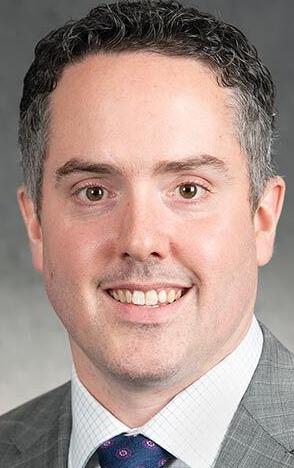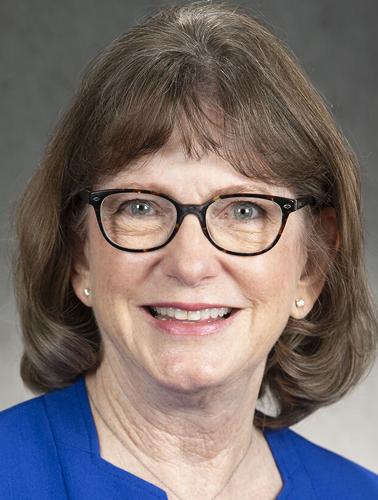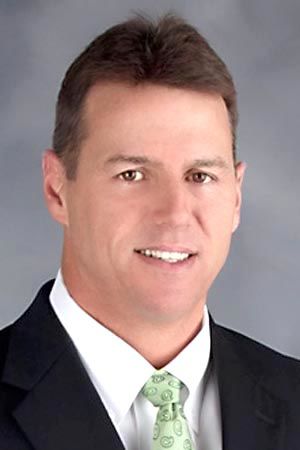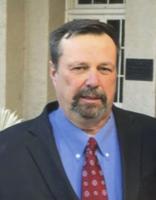MANKATO —In the early days of a post Roe v. Wade world, area Republican candidates for office are celebrating, while Democratic candidates are considering ways to solidify or strengthen abortion rights.
The Free Press reached out to nine state and federal lawmakers or candidates this week asking for their views on abortion laws. Inquiries went out via email, phone call or both, with candidates given multiple days to respond.
All four DFL candidates running for seats in the state House, state Senate and U.S. House responded, compared to three of the five Republican candidates in the same races.
Their responses offer clues into what future abortion rights could look like in Minnesota and nationwide, depending on how 2022 elections shake out.
“I know there are political winds from the extreme right that want to ban abortion even here in Minnesota,” said Rep. Luke Frederick, DFL-Mankato, running for re-election in House District 18B. “I’m fully opposed to any such measures.”

Luke Frederickv
Luke Frederickv
By overturning 1973’s landmark decision in Roe v. Wade, U.S. Supreme Court justices ruled abortion access is no longer a federally protected right. It means states now have the ability to ban abortions, with some states having trigger laws at the ready once the court ruling came down.
Republican candidates applauded the decision. Rep. Susan Akland, R-St. Peter, running for re-election in House 18A, said the Supreme Court moved the country forward on protections for the lives of the unborn.
“In a civilized nation the value of each and every child, each and every tiny, vulnerable human being, is to be cherished and nurtured and protected,” she said. “Americans have waited almost 50 years for this historic day, and I am thankful for the decision of our Supreme Court justices.”

Susan Akland
Jeff Brand, DFL-St. Peter, running in House District 18A against Akland, said the ruling means young women have fewer rights than their mothers and grandmothers had. And government shouldn’t have jurisdiction over medical procedures, he added.

Jeff Brand
“Two generations of reproductive freedom were eliminated by the decision,” he said. “As a candidate for office, my position is clear: I’m pro-choice. I support the ability of the people of Minnesota to make their own bodily decisions.”
The Supreme Court decision was a step backward, said Sen. Nick Frentz, DFL-North Mankato, running for re-election in Senate District 18.
“We should not be taking rights away from women when it comes to decisions they make about their own body,” he said.

Nick Frentz
Nick Frentz
Isolated state
Minnesota’s current laws make it like an island in a sea of Midwestern states with strict abortion restrictions or bans on the books or in the works. Elective abortions are legal in Minnesota up to the time a fetus is considered viable, roughly 24 weeks into a pregnancy.
Abortions after 24 weeks can be done in hospitals if a pregnancy risks putting the mother’s life in danger. The overwhelming majority of abortions in Minnesota in 2021, 91%, occurred within the first 12 weeks of a pregnancy, according to the Minnesota Department of Health’sannual abortion report submitted to the Legislature.
Abortions late in pregnancies have less public support compared to abortions earlier in pregnancies, although late-term abortions are just about non-existent in Minnesota. Only one abortion in the state out of 10,018 total in 2021 occurred during a woman’s third trimester, indicating the medical procedure was performed due to the mother’s health risks.
Health risks led 1,526 women in Minnesota to seek abortions in 2021, according to the report. Maternal health risks are the standard exceptions in states where abortions will be otherwise banned.
至少10共和党控制的州,主要是我n the southern U.S., have passed abortion restrictions without exceptions for rape or incest. In blunt terms, such laws in Minnesota would’ve forced at least 44 women who were the victims of rape and 11 women who were the victims of incest in 2021 to give birth to their rapist’s and/or family member’s child.
Asked about pregnancies resulting from rape or incest, Dar Vosburg, a Mankato Republican running against Frederick, said she believes “there should be exceptions.”

Dar Vosburg
Laws requiring women to carry their rapist’s child to term are “asinine,” Frederick said.
“It is so stupid, and the people out there that want to say that it’s God’s intention, that if you get raped and pregnant it’s his will, that’s equally asinine,” he said.
Brand called such laws “warped.”
“For anybody or any entity to do that seems to be straight out of science fiction,” he said. “But that seems to be where we’re headed.”
A galvanizing issue
明尼苏达州众议院和参议院的共和党人proposed and/or supported bills in recent years that would ban abortion once a “fetal heartbeat is detected,” with exceptions for medical emergenciesbut no exceptions for rape and incest.
Despite the proposed bills by her colleagues, Akland said she didn’t think Roe v. Wade would have any “immediate impact here in Minnesota.” To pass similar bills in the future, Minnesota Republicans would need to flip control of the House and governorship — Republican candidate for governor Scott Jensen has called for abortion bans with exceptions only for medical emergencies — and retain control of the Senate in the upcoming election. A re-election for Gov. Tim Walz would likely result in him vetoing any restrictive bills given his support for abortion rights.
Right now nothing will change in Minnesota, Frederick said, but there’s nothing saying Republicans won’t introduce a constitutional amendment banning abortions if they’re in power. Frederick voiced support for legislation banning Minnesota companies from sharing women’s personal data with states where abortions are illegal.
Minnesota saw 932 women from Wisconsin, South Dakota, Iowa or North Dakota come to the state to receive abortions in 2021. Already on an upward trend before Roe, it’s not hard to imagine the numbers jumping up post-Roe. The law that Frederick suggested could protect women from out of state against repercussions once they return home after a legal abortion.
“It’s turning into complete chaos,” Frederick said. “I want people in Minnesota to feel safe in getting the health care they need, and I think they deserve it.”
With polls generally showingsupport for abortion rights民主党议员和候选人都听到ing voters bring up the the issue on the campaign trail. They say public sentiment among Minnesotans, including southern Minnesotans, is on their side.
“I think the majority of Minnesotans want reasonable access to reproductive health care and abortion,” Frentz said.
Jeff Ettinger, the DFL-endorsed candidate for U.S. Congressional District 1 in southern Minnesota, said his campaign has polling showing two-thirds of voters in southern Minnesota believe abortions should be legal with some restrictions in place — essentially what Minnesota has on the books now. Republican candidates for the seat Brad Finstad and Jeremy Munson didn’t respond to an inquiry emailed to their campaigns.

Jeff Ettinger
Ettinger said he recently met with voters in the city of Blue Earth, where some told him they’re not pro-abortion but they do believe women should make the decision rather than government. It was an example of how nuanced views on the issue are across the ideological spectrum, much more than merely viewing the issue in terms of “pro-life” versus “pro-choice.”
“People are bringing it up a lot,” he said. “It’s a major concern to some folks.”
The issue is at the top of people’s minds in the St. Peter area, Brand said. He saw people reach out to volunteer for his campaign immediately after the Roe v. Wade decision.
“This issue is going to seriously promote more activity and enthusiasm to vote this year,” he said. “It’s a galvanizing issue.”
It’s absolutely something potential voters are bringing up during door-knockings, Frederick said. And abortion isn’t the only Supreme Court decision voters are following.
Justice Clarence Thomas, Frederick noted, also signaled a desire to overturn Supreme Court precedents protecting Americans’ rights to contraception, same-sex relationships and same-sex marriages. It’s extremism, he said, adding thataccess to contraception is known to lower abortion rates.

Mark Wright
In contrast, Mark Wright of North Mankato, who’s challenging Frentz in Senate District 18, said issues other than abortion will be more important during the 2023 legislative session. He named inflation, parent anger at political indoctrination of young children and lack of support for public safety as examples.
“There are other issues that the 2023 Legislature will need to address when they meet this coming January,” he said.
On abortion, he said he’ll need to familiarize himself with Minnesota’s abortion laws before speaking further on the issue.
“It’s not something I’ve made myself privy to,” he said.
At the federal level, Republicans have called for bills banning abortions nationwide following the Supreme Court decision. Democrats, meanwhile, will eye codifying Roe v. Wade’s protections in federal law if they retain control of the U.S. House and make gains to their tenuous control in the U.S. Senate — state legislators could also seek to codify abortion rights in Minnesota.
Ettinger said he’d support such a move by Democrats if he’s elected to Congress, as the will of the electorate would be in opposition to the Supreme Court’s decision to overturn established precedent.
“I think we should be seeking to codify Roe v. Wade,” he said, pointing out that the opposition wants the government to “make criminals out of women and their doctors for their private health care decisions.”



































Commented
Sorry, there are no recent results for popular commented articles.